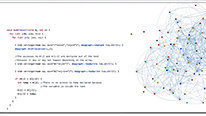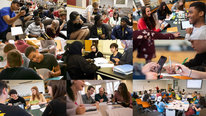Transforming mental models of climate change through simulations, games, and ...
NSF Awards: 1245581
2017 (see original presentation & discussion)
Undergraduate, Graduate, Adult learners, Informal / multi-age
The World Energy exercise enables people to try out and explore the policies and investment scenarios that allow them to reach their goals on climate change. With a focus on the mix of solutions that will lead to a more stable climate, this simulation can inspire hope that is grounded in our best understanding of the dynamics of the energy and climate system.
What policies would you choose to enable a future that:
- stabilizes global warming well below 2 degrees C temperature rise, or even 1.5 degrees C?
- supports economic health?
- provides for equity?
- minimizes environmental damages?
- is viable if human civilization is at its best?
For World Energy, participants are divided into teams that represent different sectors and negotiate with each other to come up with a global energy scenario that could lead to a safe and equitable clean energy future. Each team controls a handful of levers that are related to their sector and can be adjusted in the computer simulation En-ROADS. For example, the group focusing on energy supply has control over the levers that drive investment in renewable, gas, nuclear, and coal energy. Groups then present their plans and it is compiled and analyzed in real-time with En-ROADS.
Related Content for The World Energy Simulation
-
 2016The World Climate Simulation
2016The World Climate Simulation
Juliette Rooney-Varga
-
 2019Bringing Real-World Data and Visualizations into CS courses
2019Bringing Real-World Data and Visualizations into CS courses
Kalpathi Subramanian
-
 2018S-POWER Engineering Pathways for Transfer students
2018S-POWER Engineering Pathways for Transfer students
Claire Duggan
-
 2018The Engineering Ambassadors Network
2018The Engineering Ambassadors Network
Joanna Garner
-
 2018Teaching about Earth for a Sustainable Future: The InTeGrate
2018Teaching about Earth for a Sustainable Future: The InTeGrate
Cathryn Manduca
-
 2016Scenes from the CUSP – Changing Ideas about Climate Change
2016Scenes from the CUSP – Changing Ideas about Climate Change
Raluca Ellis
-
 2017Creating city-scale learning ecologies for climate change
2017Creating city-scale learning ecologies for climate change
Raluca Ellis
-
 2021POGIL and The POGIL Project
2021POGIL and The POGIL Project
Rick Moog

Heidi Carlone
Professor
This project intrigues me because of its potential to engage participants in rich, authentic scientific practices (modeling, simulation, argumentation, critical thinking). Their apparent investment in outcomes makes more likely that their engagement in these practices is more vibrant. What kinds of participants have access to this simulation and program? Are there plans to make it more widely accessible? I think it could be an outstanding pedagogical tool for high school and/or college classrooms.
Juliette Rooney-Varga
Director, Associate Professor
Thanks for your comments! The simulator and all of the supporting materials are freely available for anyone to download and use. World Energy has been used at levels ranging from high school to graduate school, as well as with professionals in a variety of fields. In fact, most recently, ~100 UMass Lowell Engineering faculty members played World Energy as part of their faculty retreat! We are continuously improving the materials and welcome feedback on how to make the simulation more accessible to audiences in diverse educational settings.
Heidi Carlone
Sarah Garlick
Director of Science Policy and Outreach
I was struck by the compelling comment in the video that we are never going to experience the consequences of our decisions in issues as complex as climate change, so we need simulations. I'm curious to hear about how participants think about their role-playing decisions in the simulation related to their real decisions in everyday life. Do you have data about impacts following the experience?
Juliette Rooney-Varga
Director, Associate Professor
Yes - we have been evaluating World Energy and have conducted extensive research on a similar simulation, World Climate. For now, I'll share that our data on learning impacts from World Climate show significant gains climate change science knowledge, affective engagement with the topic, and desire to learn more about it. We have a paper in review on that work now and are currently writing one about World Energy. We are also eager to collect more data. Educators can get involved with our research effort by going to: http://climate-change-initiative.org/research/j... .
Sarah Garlick
Claire Quimby
Research Associate
Watching this video, I can't help but think of Model UN! They seem to encourage many similar skills and probably have many similar outcomes for participants. Have you tried switching up the delivery of this simulation to test different outcomes for players? For example, I wonder how things might differ if individuals were assigned to one group (e.g. Land and Agriculture) for the duration of the simulation versus having to change groups midway through.
Juliette Rooney-Varga
Director, Associate Professor
Yes, the simulation does have some similarities to Model UN. We haven't tried to shift people around and see how their learning outcomes change, but we do give everyone a chance to explore the full computer model and, we hope, gain a systems-level view of energy use and its climate impacts.
Henry Jakubowski
This is a wonderful project. One key aspect that should be considered is how to help the unbelievers change their views. The people shown in the video are bright and enlightened. After the recent election, I came away with view that many people turn away from science and its insights not from an intellectual but from an emotional framework. Studies have shown that data alone doesn't sway people. When smart people make poor choices there is usually an emotional issue that is involved. Simulations could provide a way to tap into emotional responses. Is there a way to move this simulation into non-academic arenas? To make it have a more emotional effect on users?
Claire Quimby
Juliette Rooney-Varga
Director, Associate Professor
Thank you for your comments! We have not yet done extensive research on learning outcomes from World Energy, but have done so for a similar simulation that we have developed, World Climate. We have found that participants in the simulation make gains in climate change knowledge, affect (in particular, a sense of urgency), intent to take action, and desire to learn more. Gains in affect were linked to learning and intent. In other words, you are right: affective engagement (and in this case, through a social experience) enhances learning and motivation.
Juliette Rooney-Varga
Director, Associate Professor
We also filtered our data set to look only at US participants who opposed government regulation of free markets - i.e., one belief linked to both a conservative world view and, in the US at least, to dismissal of human-caused climate change. Interestingly, we found that gains in climate change knowledge, affect, intent, and desire to learn more were at least as high among this group as among the rest of the sample.
Claire Quimby
Juliette Rooney-Varga
Director, Associate Professor
Lastly, we agree about reaching beyond academic audiences and are working to do so. In fact, I ran a mini-World Climate simulation with state legislators in Massachusetts, which was covered by the Boston Globe. We have also run the simulation with business executives, scientists, and citizens, and youth groups.
Henry Jakubowski
Awesome! To maximize the impact of science on policy, we have to actively engage outside of academia. I feel I haven't done that well until I felt compelled to (i.e. in the last 5 months).
Juliette Rooney-Varga
Director, Associate Professor
Agreed. Of course, most of us higher ed faculty are neither trained nor incentivized professionally to reach outside of academia. And it's often not easy to find the time to do these 'extra' activities. But it is increasingly important.
Claire Quimby
Research Associate
In response to Henry's comment, I would think that the experience of working on a team to represent a certain segment during the simulation would create some level of emotional investment, but it also would be cool to see what other things could contribute to this. For example if the participants watched a few short video interviews with people who themselves have emotional attachment to the issues. Lots of interesting possibilities!
Juliette Rooney-Varga
Director, Associate Professor
Yes, there are many possibilities. One of our core design principles is to enable people to learn and feel for themselves - i.e., avoid one-way transmission of information as much as possible and instead deliver an experience in which people explore the physical-technical system (climate and energy) through the computer model, while simultaneously exploring the complex dynamics of human decision-making through role-play.
John Anderson
I echo Heidi's opening comments about the simulation being rich, authentic and engaging. My question is whether you've designed any long-term engagement beyond the simulation itself. Do participants join an ongoing network? Is there any facilitation to help them continue learning or to encourage them to form a community that encourages application of lessons from the simulation to their ongoing work/studies/lives?
Is there evidence of lasting impact?
I was also struck by Dr. Sterman's comment that people have to learn for themselves as the only way to help them learn and change their mental models and change their behavior. I'm now convinced that the systems in which we live our lives have a HUGE influence on behavior. What we know and understand matter, but the systems we have access to shape our decisions to a great extent. (Example: if we want people to walk to the store, put the store across the street from where they live. If it's easy, we'll walk to the store) What I hope the simulation will do is to help people to design different systems (agriculture, transport, manufacture, entertainment, etc) to be far more efficient.
Further posting is closed as the event has ended.